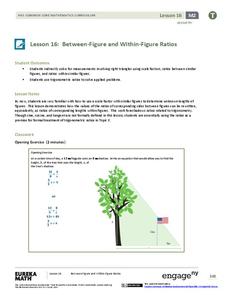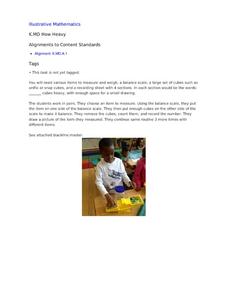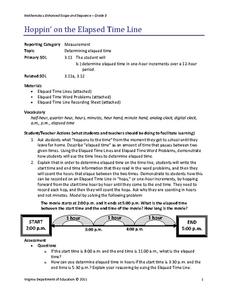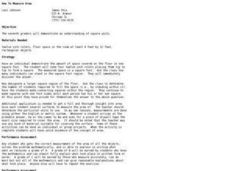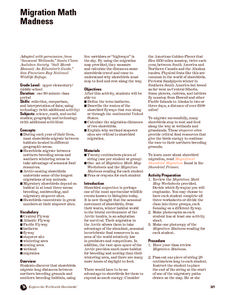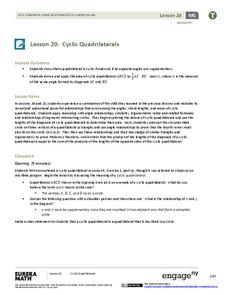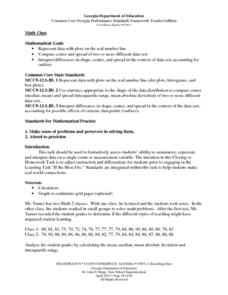State of Michigan
Pre-K Mathematics
Kick-start children's education with this pre-school math unit. Offering 31 different hands-on learning activities that develop young mathematicians' pattern and shape recognition, basic number sense, and much more, this is a must-have...
Curated OER
Measure: Perimeter, Area and Volume
Learners practice measuring with formulas. In this measurement lesson, students complete an activity that requires them to calculate perimeter, area, and volume.
Curated OER
Measurement: Finding Areas of Rectangles
Gardening geometers construct the formula for the area of a rectangle by viewing a video revolving around two young people, their lawn mowing business, and their need to charge by the square meter. A relevant real-life application lesson!
EngageNY
Between-Figure and Within-Figure Ratios
Tie the unit together and see concepts click in your young mathematicians' minds. Scholars apply the properties of similar triangles to find heights of objects. They concentrate on the proportions built with known measures and solve to...
Curated OER
How Heavy
Break out the balances for this primary grade lesson on weight measurement. Using common elementary school manipulatives like unifix or snap cubes, young mathematicians determine the weight of four different classroom objects. A graphic...
AJ Reynolds
Unit 5 Section 2: Measuring Angles
An interactive assignment displays two example angles to teach how to measure them. When you click on the angles, a protractor appears! As practice, learners view a set of angles, estimate the size of each, and then enter the degrees in...
Curated OER
Home Living / Daily Living : Measure Ingredients
Cooking often requires one to measure out ingredients. Build an understanding of relative measurements as well as a reference for future cooking projects with your special needs class. In a small group, you'll discuss various measurement...
Illustrative Mathematics
Which Weighs More? Which Weighs Less?
Expand the the comparative language of young mathematicians with a hand-on weight measurement activity. Working independently or in pairs, children compare the weight of large wooden blocks to various other classroom objects, recording...
Virginia Department of Education
Hoppin' on the Elapsed Time Line
Time flies when you're teaching math! Okay, maybe not for everyone, but this lesson will have your young mathematicians calculating elapsed time before you know it.
TryEngineering
What is a Nanometer?
Exactly how small is a nanometer? Scholars investigate the scale of a nanometer by measuring classroom objects and converting these measurements to nanometers.
Curated OER
Math Cross, Puzzle #26
Here is a measurement, money and time activity which invites learners to solve twenty-eight math problems utilizing addition, subtraction and multiplication strategies to complete a math crossword puzzle.
Illustrative Mathematics
Longer and Heavier? Shorter and Heavier?
For many young children it seems obvious that longer objects are heavier than shorter objects. This assumption is put to the test as the class investigates the relationship between length and weight in a whole-group activity. Using a...
Illustrative Mathematics
Size Shuffle
In the eyes of children the world is a simple place, objects are either big or small. This simple activity aims to expand the comparison language of young mathematicians as they use the words taller and shorter to compare their height...
Curated OER
How To Measure Area
Geometers learn how to measure the area in square units. They use the floor in the classroom as a visual to measure a square foot area. They use classmates to fill the space and expand the measured area square foot by square foot until...
California Academy of Science
How Big is Big?
In a math or life science class, "mini-me" models are created with cardstock to reflect a 1:10 scale of students' bodies. Learners measure each others' heights with meter sticks, and then reduce the size by 10. After this exercise, they...
Curated OER
Measurement: Lesson 3
Eighth graders investigate the concepts that are related to measurement while focusing upon weight, mass, and capacity. They estimate the weight and mass relationship that is found in different problems. Students compare and contrast one...
Granite School District
Vocabulary Cards 1st Grade M-Z
Clarify key math vocabulary terms with this series of printable cards. Three different versions of each term are provided; one with only the word, one with the word and a picture, and one with the word, a picture, and a definition. Note...
Curated OER
Fish and Clips
Youngsters test magnetic strength by measuring the mass of paper clips that they "hook" with a magnet. Your first and second graders should love the hands-on activities associated with this plan. The reproducible materials are quite good...
Curated OER
Take Math Shopping!
Percents, estimation, and comparative analysis become more understandable when they are used in-context at the grocery store.
Curated OER
Stadiums in America
Let's play ball! A great springtime activity to learn about ratios. This activity challenges learners to draw stadiums to scale on standard letter paper and also on construction paper. This three-day instructional activity includes a...
Curated OER
Measuring Area: Sensible Flats
Here's how to calculate the areas of polygonal figures. In this measuring area lesson, upper graders use hash marks to create and count square units. They also problem solve a cyberchase activity watching Quicktime videos.
Prince William Network
Migration Math Madness
A great way to incorporate math into life science, this lesson has learners measure migratory routes on a map and calculate the actual distance that shorebirds on the routes would cover. Learners compute the distance covered in both...
EngageNY
Cyclic Quadrilaterals
What does it mean for a quadrilateral to be cyclic? Mathematicians first learn what it means for a quadrilateral to be cyclic. They then investigate angle measures and area in such a quadrilateral.
Georgia Department of Education
Math Class
Young analysts use real (provided) data from a class's test scores to practice using statistical tools. Not only do learners calculate measures of center and spread (including mean, median, deviation, and IQ range), but also use this...





